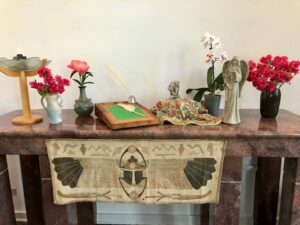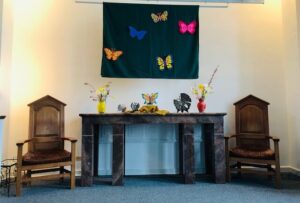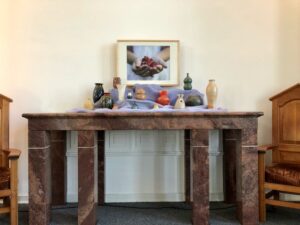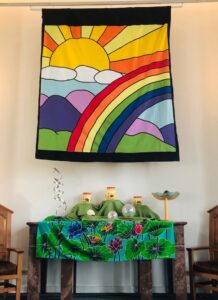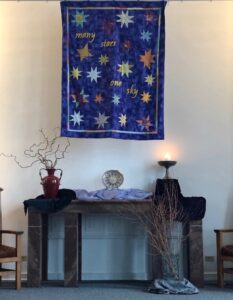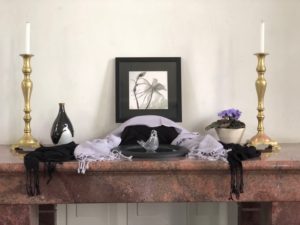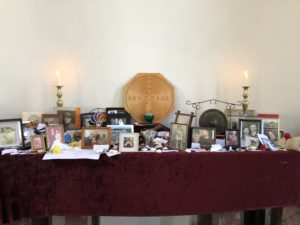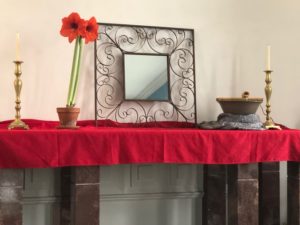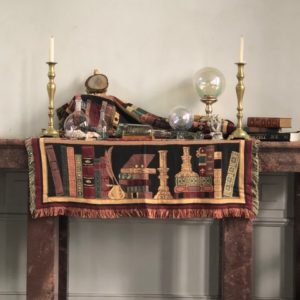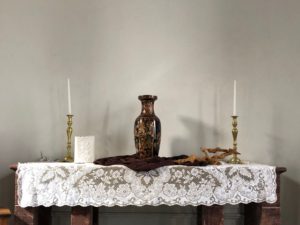Read the Order of Service
Spiritual liberation can feel ecstatic. Throughout history, world religions have found ways to keep a person grounded even while liberated from this world.
Download a pdf copy of this sermon.
—
Out of this Word
Sermon for March 13, 2016
Thomas Jefferson Memorial Church Unitarian Universalist
By Rev. Alexandra McGee
Consider this scenario, which is based on a true story told to me…
When my brother and I were in our 20’s, we both lived in Oregon, on the coast. One day I got a call that he was in the hospital. I arrived and found him in a room, looking out the window at the ocean out past the city. He began to tell me about how he had just been spending time at the beach before he came to the hospital, and was feeling very much one with God. By being in the waves, he felt the cycle of nature, and being in the salt water made him know he was connected to all of creation, since we are all have salt running through our veins. He described how he had been sitting on the rocks and feeling their grounded solidness, connecting him to the core of the earth, and how that connects him to his bones. He was knowing himself and the universe at the same time.
As I listened, I was grateful for my Unitarian Universalist theology, which makes space for welcoming many ways of knowing the holy. I was happy for my brother that he had been having a meaningful spiritual connection.
But after about 10 minutes of talking, I began to realize that something didn’t feel quite right — he had been speaking without pause for 10 minutes. Also, everything seemed well for him—there was no indication of distress that he was ill or in the hospital. I began to have a different feeling inside…that my brother was caught up in his ego. So, I gently interrupted to ask why he was in the hospital. He spoke for quite a while more, explaining that police had pulled him out of the ocean against his will and brought him to the hospital and that he would have to stay for three days before he would be allowed leave, after a psychiatrist gave approval. He spoke at length again, not engaging in conversation. Eventually, I was able to ask him why the police would come to a beach and interfere with someone enjoying nature. He said that he had been in the water for three days and the park rangers reported it to the police, and they determined he was a danger to himself due to dehydration. He had not felt the need to eat or drink during his three days sitting on the huge rocks in the water at beach. During the visit, I recall a nurse came in the room, and he didn’t greet her with his usual friendliness. I now had a third feeling…worried for my brother and his health.
I tell you that story because I think it is somewhat universal. Perhaps you yourself have had experiences in which you felt a deep spiritual richness, but others felt it wasn’t good for you? Or perhaps you have been with someone who is elated about a spiritual experience, but you wondered whether it was good for them?
Right now, as I raise these questions, we are here in a Unitarian Universalist congregation. We UUs tend to be a heady lot. Humanists, atheists, and agnostics find a home in Unitarian Universalism because we lean toward being questioning and cerebral. If we consider all of human religious experience on a spectrum, that spectrum might have on one end this cerebral, analytic way of experiencing religion. Now the other end of the spectrum is much more religiously expressive and intuitive. Now, the good news about Unitarian Universalism is that we are welcoming, and some of us do experience our spirituality that way. But, in general, we are not on the end that you would call ecstatic. Because some of us don’t spend much time in this arena, we may feel uncomfortable with it. So, we may miss out on something very important — when an ecstatic spiritual experience is healthy, and when it is not. Please hear me say that again: We can learn to distinguish when an ecstatic spiritual experience is healthy, and when it is not.
Here is the suggestion I would like to make: If someone is enthusiastically declaring what is right and nourishing to them, but unable to see their effects on other people, then something is not actually connected to the holy. To me, that gives us a check for examining whether religious fervor is a fever.
Let me give an example. A Buddhist teacher named Charlotte Joko Beck wrote a book about meditation. She described an event in which she had been working with a group of student meditators over a few years. At one point, one of the students had a break through moment. He was very excited about his newfound enlightenment and wanted to share with his teacher. So, he called her up to tell her. Her response: “part of enlightenment is knowing not to call me at 3 am to tell me you’ve found enlightenment. Let me me finish my night’s sleep and tell me in the morning.” In this story she is trying to explain that a spiritual grounding means we see our impact on other people.
In case you misunderstand me, let me be clear that I think it is fine to be alone. I agree that many great spiritual insights have been had while being a hermit. It is fine to have ecstatic experiences, and to be in great reverie.
But in the story I told you at the beginning, the young man in the hospital was alone in his spiritual reverie to an extent that he was harming himself—he was separated from community and his well-being. He had stayed in the ocean until he was so dehydrated that he was at medical risk.
What can you do if you find yourself in a situation where others are concerned for you? How do you know whether to trust them? This is why it is good to cultivate relationships with people who will give us honest feedback. This might be friends, it might be a peer support group, it might be a counselor, or another trusting relationship. They can affirm the true nugget inside of you—what is wonderfully, uniquely you, and what you want to hold on to no matter what the world says. And they can help you balance that with needing to be part of a community.
So, how do these questions fit into our life here as a congregation?
When people come to our church, they may have heard the myth that UUs can believe anything they want. One problem with this myth is that it can leave us with a tolerance that is open to dysfunction instead of open to the holy.
- We are in a covenanted community here. Earlier in the service we read the covenant. We covenant to celebrate diversity, nurture inclusiveness, embrace one another spiritually and emotionally, and communicate with compassion and respect. My friends, this is perhaps one of the hardest and yet most important parts of being in spiritual community together. This is done in covenant groups, it is done in Adult Faith Development classes, it is done when the board makes decisions, it is done when parents discuss how the religious education programming is working for their children, it is done when the Young Adults gather and discuss the sermon. Each of these, and many other aspects of church life can be very challenging, and they are rich opportunities.
How can we make sure that we remain inclusive? What I am hoping to communicate today is a tool by which you can navigate situations in which you encounter difference and are trying to be accepting — but feel pushed to your edge. Whether that is here in our covenanted community, in a political conversation with a neighbor, over dinner at a family reunion, or visiting another country: here is the rule of thumb I suggest: if a person is able to share the listening and speaking, and if they are able to refrain from causing harm, and they tell me their spiritual beliefs are leading them there — then I buy that. Otherwise, I don’t believe that I need to tolerate their actions. But we remain inclusive by calling each other back into covenant.
By definition, the Sacred is Loving and Inclusive. By definition, the holy makes space for Freedom and Reason. These are principles of liberal religion, whether that is a liberal Jewish synagogue, an earth-based pagan group, a liberal Baptist church, or a Unitarian Universalist congregation. These principles apply wherever you are on the globe, and whatever century you live in.
The ministry theme this month at our church is Liberation. Liberation is a spiritual experience that runs through world religions and is a common human longing and experience. Liberation is a gift and grace that enriches our lives and helps us enrich the world. The reason a spiritual life is worth examining is because sometimes we feel confused about where we are on the path. The particular issue that I have been trying to grapple with here today is when one person feels they are experiencing Liberation, and it is at the expense of other people. Let us be clear, then: True liberation also contributes to the liberation of other people.
May we take inventory of our own actions and see whether our spiritual passion has accidentally become religious fervor. Even if you are humanist or atheist and don’t consider yourself spiritual: ask yourself, is my enthusiasm contributing to the well-being of all?
I would like spend the second half of this sermon on an example from history.
In the 1780’s, a religious group was founded in New England. They called themselves the United Society of Believers in Christ’s Second Appearing. They lived together in large buildings like dormitories, they worked together in their industries and pooled all their income. They raised children together and considered the group one big family.
They believed that heavenly spirits came to earth, bringing visions, often giving them to young women, who danced, whirled, spoke in tongues, and interpreted these visions through their drawings and dancing. Rapturous dances, for which the group gained notoriety, allowed for emotional release.
Like many groups that are misunderstood, they were called another name by other people. Because of the trembling, whirling, and shaking they engaged in during ecstatic worship services they soon became known as Shakers. As their religious communities grew and they moved to set up new farms and industries, the new neighbors were often skeptical, mocking, or outright persecuting at first.
During the 1800’s a religious debate was going on in our country. On the one hand were people like the Shakers, who were part of a movement that historians called the Great Awakening, when many tent revivals were popular. These Christians believed that society’s problems with being too materialist could be solved by following the holy spirit and sharing everything in love. They were ecstatic about justice and a new world order.
On the other hand were Christians who believed that proper morals and character came from careful reasoning. They criticized the revivalists, saying that the religious enthusiasm was just ego or prideful imaginings.
This second strand led in part to the Unitarian tradition we share today. But I find that we have carved a third path—one that allows a quiet reverie. An example is our labyrinth ministry.
This raises a question: who is to say whether a person is truly inspired by something sacred or by their imaginings?
One historian who studied this period (David Robinson, The Unitarians and the Universalists, p. 12) concluded that “the problem remains of how to distinguish between true and false inspiration” and this has regularly been the center of many religious controversies since. I suppose that is why I am raising it again here today.
But there is more to tell you about the Shakers.
Even in the 1780’s, they were founded by a woman. They had advanced notions of equality between the sexes and the races. They were pacifist—meaning they opposed war (just like some of the people that sit in our front row here each week). They were admired for their industry, clean farming practices, and inventiveness. One of the women there invented the circular saw.
So, eventually, their neighbors came to respect them quite highly.
The Shakers found a way to blend two very important things: freedom and responsibility.
Their spontaneous religious dance was done within the context of community.
Their theology of liberation and their theology of community are bound together. The possibility of extremism through religious rapture is moderated by the grounding of the shared dance.
Listen to the words of the Shaker song we sang earlier:
‘Tis the gift to be simple, ’tis the gift to be free
‘Tis the gift to come down where we ought to be,
And when we find ourselves in the place just right,
‘Twill be in the valley of love and delight.
When true simplicity is gained,
To bow and to bend we shan’t be ashamed,
To turn, turn will be our delight,
Till by turning, turning we come ’round right
Amen.


